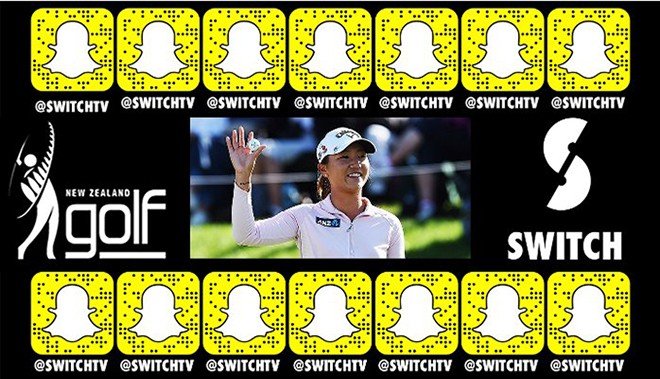TV on Snapchat: NZ entrepreneur looks to capitalise on Christchurch Open

When Kiwi entrepreneur Robett Hollis found out that world number one women’s golfer Lydia Ko’s defence of her title in Christchurch was not being broadcast live on any local channels, he took things into his own hands.
“Switch TV was created within 48 hours because Lydia Ko wasn’t getting any love,” says Hollis.
“She’s the world number one, in New Zealand, defending her title, and there was no live coverage of her anywhere. With all the technology that exists and all the existing media players in the market I don’t think that’s good enough, and neither did the rest of New Zealand.”
Dear Lydia – WE HAVE A SOLUTION!
Dear Lydia Ko – WE HAVE A SOLUTION!HEADING TO THE OPEN THIS WEEKEND?STEP 1 : Add 'SwitchTV' on SnapchatSTEP 2 : Send us any pics, videos and any behind the scenes content you wish direct to 'SwitchTV' on Snapchat. And we'll share the lovehttps://www.linkedin.com/pulse/dear-lydia-we-have-solution-robett-hollis?published=t
Posted by Robett Hollis on Wednesday, February 10, 2016
Hollis says he understands the monetary constraints that preclude media companies from airing the sport, but he felt there must be an alternative offered by modern technology.
He then contacted Ian Taylor, the man behind the virtual broadcast of the America’s Cup, and the pair came up with the idea to live-stream the entire event through Snapchat—and thus Switch TV was born.
Rather than taking the guerrilla approach of video-recording the event on the sly, the pair contacted NZ Golf’s Dean Murphy, who went against the conservative image of the sport and boldly agreed to participate in the experiment.
Hollis partnered with Kiwi company Mish Guru to provide a consistent stream of updates related to the event via Snapchat in a similar vein to what Vodafone did during last year’s Music Awards.
“By having [Mish Guru] on board with Switch TV from day one we are already on the same page and have a tonne of rad ideas on how this can further empower kiwis to have a real-time voice within news, sport, events and more.”
Hollis says his aim is to turn this hype into a social TV network that specialises in this type of content. But to do this, he needs a partner willing to invest in the project.
And in keeping with his entrepreneurial style, he didn’t send polite emails to a range of potential suitors. Instead, he stood on his social media soapbox and outlined his intentions with a short video, which could be interpreted as an elevator pitch of sorts.
“Within 30 minutes of our launch video going live on LinkedIn I was approached directly by two heads, one from a major telco and another from one of New Zealand’s biggest media companies. Why? Because if they don’t disrupt themselves – someone else will.”
Hollis admits that media companies might be taking a long shot by backing him, but he thinks it could potentially pay off.
“I fully understand that in the eye of many I’m just an unknown grommet, but sometimes it’s the self-made, laser-focused small guy with nothing to lose that you need to watch out for.”
“If we could pull this together for Lydia in 48 hours with no support, no budget and no partners. Imagine what we could do with a like-minded strategic partner that has some skin in the game?”
No one could fault Hollis for his enthusiasm. But he is also operating in a grey area that could come with a few legal pitfalls.
Broadcast rights holders are particularly protective of sporting events, and an initiative like this could be stepping on quite a few toes.
However, Hollis believes this isn’t comparing like to like. He says that he is essentially offering a second-screening experience rather than a traditional TV broadcast. The argument is that social media doesn’t really fall into the remit of standard broadcast rights.
“At present we have no desire to be a broadcast TV network and we have no desire to buy any types of digital rights. I do believe that with our tech, team and storytelling ability Switch TV could be the ultimate second screen experience for the existing content ecosystem.”
Hollis’ assessment might be correct; but as was seen with the Global Mode stoush, rights holders are willing to go to legal means to protect their broadcast rights if they feel tech innovations are infringing on them.
In the context of a social TV network, it wouldn’t be much of a stretch for sports rights holder to view a spliced together rundown of an event—filmed on mobile phones—as a form of a highlight reel, which currently serves a source of revenue for rights holders. In fact, this has already been seen in the US, where the NFL issues take-down notices to companies providing access to highlights and analysis via social media (interesting, the NBA takes a different position, seeing this type of coverage as promotional and driving interest in the sport) .
Hollis is combative, saying he isn’t concerned about this issue, because it would prove very difficult for a rights holder to police social media activity in a stadium or event setting.
“You can’t stop progress,” he says.
“Good luck trying to stop 50,000 people bringing smartphones into Eden Park to watch an All Blacks game and taking pics. Or stopping the people protesting TPPA from streaming off their phones. If ‘they’ get precious about these type of issues they’ll literally be like the dude who bought a shit tonne of horses right before Henry Ford launched the car, even though they knew what was coming.”




